CLICK HERE for the latest market quotes from the Iowa Agribusiness Network!
CLICK HERE for the latest market quotes from the Brownfield Ag News Network!
CLICK HERE for the latest market quotes from the Iowa Agribusiness Network!
CLICK HERE for the latest market quotes from the Brownfield Ag News Network!
(Harrison and Montgomery Counties) – Multiple agencies battle field fires in western Iowa, Sunday afternoon. The flames were spread quickly by strong winds, and resulted in the voluntary evacuation of some residents, especially in Montgomery County, where a fire quickly went out of control and spread some three-to four miles before being brought under control at around 8:30-p.m.
Emergency Management Coordinator Brian Hamman reports “The Montgomery County Communications Center received multiple 9-1-1 calls at 4:47pm reporting a small ditch fire in the area of Highway 34 x A Ave. Mutual aid was requested immediately prior to any fire units arriving on scene due to wind conditions. Once fire crews arrived on scene, the fire grew rapidly and spread quickly north to adjoining fields. Several homes in the area were evacuated by law enforcement and mutual aid was again requested from numerous area fire departments.
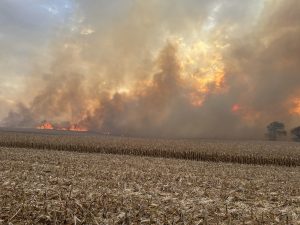
Brian Hamman photo
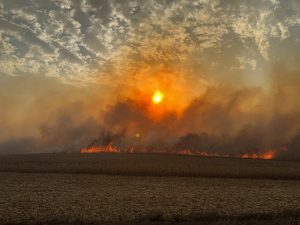
Brian Hamman photo
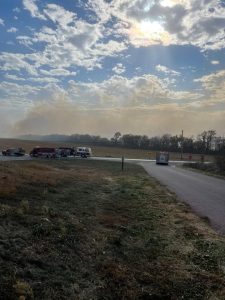
Harrison County fire
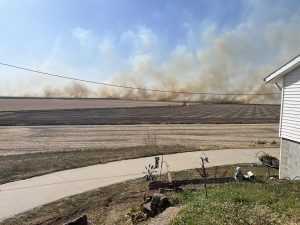
Harrison County fire
A combine fire Saturday afternoon spread to stand field of corn, with Shelby and Harrison counties had fire departments respond to a combine fire that spread to standing corn. Shelby, Portsmouth and Persia were all assisted by some much appreciated tractor operators with discs.
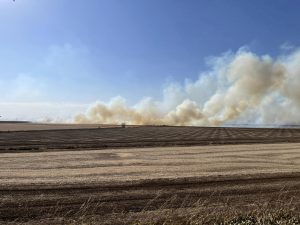
Shelby County Emergency Svcs. Assoc. photo
Montgomery County Field Fire assisting agencies:
(Radio Iowa) – A rare bumble bee has been sighted in northeastern Iowa. Kaytlan Moeller, outreach coordinator for Dubuque County Conservation, calls it a “super-exciting” find. “The rusty patched bumble bee is a designated, federally-endangered species,” Moeller says. “It’s been endangered since 2017 and is actually one of about 21 bee species that are endangered in the United States. And we happened to find this rusty patched bumble bee in some of our what we call pocket prairies in Dubuque County.” The bees were found in a “Mowing to Monarchs” program prairie area late this summer. The county created the program to develop native habitat three years ago, with the goal to help the endangered monarch butterflies and other pollinators.
“You’re transforming your turfgrass over to monarch habitat,” she says. “Monarchs are kind of a keystone species, so if you have monarchs in your areas, you have other very sensitive and rare pollinators as well. So it was the goal to build habitat for our community here in Dubuque County and yes, it’s doing exactly that.” All Iowans can help pollinators like bumblebees and butterflies. Moeller says it’s as simple as leaving your fall leaves and other dead plants where they are for the winter, a movement called “Leave the Leaves.”
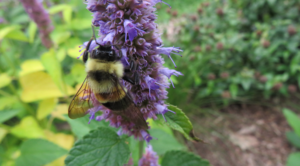
Rusty Patched Bumblebee (Photo by Dubuque County Conservation)
“The best thing to do with your pollinator garden or any of your landscaping that you have in your yard is actually to leave it because those native species use that area for a refuge,” Moeller says. “They overwinter in the form of an egg or maybe as an adult or maybe a queen bee who’s actually impregnated for next spring. She’s going to come out and make a new hive.” Moeller says our yards can help sequester carbon, improve water quality, rebuild biodiversity and still be beautiful.
Nearly 200 Dubuque County landowners have participated in this ongoing program, planting 120,000 square feet of prairie — and Moeller says it’s been a big success that has the potential to take off in other areas, too.
(Radio Iowa) – This year’s Iowa-based World Food Prize is being awarded to a NASA climate scientist. Cynthia Rosenzweig is a senior researcher at the Goddard Institute for Space Studies. She studies the effects of climate change on food systems. During her acceptance speech last night in Des Moines,
Rosenzweig said climate change mitigation needs to address greenhouse gas emissions from food systems. She also highlighted the urgency to act against climate change. The award comes with a 250-thousand dollar prize. Rosenzweig says she’ll use that money to establish a fund for global workshops on climate change and food through the Columbia Climate School.
(Radio Iowa) – Republican Congresswoman Ashley Hinson — a critic of President Biden’s student loan forgiveness plan — supports the new debt relief program for farmers. “I see those programs as fundamentally different,” Hinson says. The U-S-D-A is providing one-point-three BILLION in debt relief to 36-thousand farmers who face foreclosure or have fallen far behind in loan payments. “That plan is different from the student loan debt plan,” Hinson says. “The student loan debt plan is just a transfer of those dollars. It’s handout to people who may be making more than someone or someone who chose not to go to college has to pay off someone else’s debt that they legally incurred and signed on the dotted line.” Hinson says it’s important to take into the financial pressures on farmers.
“Their input costs are up about 300% — some of them have told me that,” Hinson says, “and that is a huge increase in not only their input costs, but their break even costs.” Hinson made her comments this (Friday) morning with a conference call with Iowa reporters before leaving for her first public event this week. Hinson was admitted to a hospital in Cedar Rapids Sunday for treatment of a kidney infection and released Tuesday. Hinson told reporters this (Friday) morning she feels much better.
“I’m on the road to recovery and I’m so grateful for all the incredible doctors and nurses at UnityPoint (the Cedar Rapids hospital where she was treated),” Hinson says. “…I’m doing great and I’m ready to get out and hit the road.” Hinson, seeking reelection to a second term in the U.S. House, faces Democrat Liz Mathis, of Hiawatha, in Iowa’s new second congressional district which includes Mason City and Dubuque as well as Cedar Rapids.
(Radio Iowa) – Iowa hunters will be searching the countryside for pheasants starting next weekend. Nate Carr, a D-N-R conservation officer in Hamilton and Hardin counties, says all factors point to a good season ahead. “Coming off some of our August roadside surveys, this year we’re expecting a very similar outcome to last year,” Carr says. “Last year, we had a good number of hunters participating, about 63,000, killing an estimated 370,000 birds, which is the highest we’ve seen in probably the past 10 years.” Carr offers a few reminders for Iowa’s pheasant hunters, be they new to the sport or seasoned veterans.
“Of course, you need your hunting license and habitat fee,” Carr says. “Shooting hours start at 8 AM and end at 4:30 PM, a little bit earlier than some of your typical hunting seasons, so remember to shut that off at 4:30. The daily limit is going to be three pheasants.” A hunter’s attire is also important, not only to keep them warm but to keep them safe. “Hunters are required to wear at least one article of external clothing that has at least 50% of solid blaze orange,” Carr says. “Whether it’s a hat, vest, jacket, something along those lines, make sure at least 50% is solid blaze orange so that other hunters can see you.” Another rule for hunters is to make sure you get permission from property owners to go on private land. The season runs October 29th through January 10th.
Learn more at iowadnr.gov.
DES MOINES, Iowa (October 20, 2022) – Officials with the Iowa Department of Agriculture and Land Stewardship and the United States Department of Agriculture (USDA) Animal and Plant Health Inspection Service (APHIS), Thursday, confirmed a positive case of highly pathogenic avian influenza (HPAI) in Dallas County, Iowa. The virus was found in a non-commercial backyard flock, and this is the first confirmed case of HPAI in Dallas County. Prior to Thursday’s confirmation, the last case of HPAI in an Iowa backyard or commercial flock was May 2.
Iowa Secretary of Agriculture Mike Naig said “It is not unexpected that we would face additional highly pathogenic avian influenza challenges in Iowa given that the fall migration is underway, and many other states have recently announced confirmed cases. We continue to work with impacted producers, USDA, and other industry stakeholders to refine and implement our response plans to limit the spread of this virus. Enhanced biosecurity remains the best line of defense to protect animal health.”
Commercial and backyard flock owners should prevent contact between their birds and wild birds. Sick birds or unusual deaths among birds should be immediately reported to state or federal officials. Biosecurity resources and best practices are available at iowaagriculture.gov/biosecurity. If producers suspect signs of HPAI in their flocks, they should contact their veterinarian immediately. Possible cases must also be reported to the Iowa Department of Agriculture and Land Stewardship at (515) 281-5305.
According to the U.S. Centers for Disease Control and Prevention, the recent HPAI detections in birds do not present a public health concern. It remains safe to eat poultry products. As a reminder, consumers should always utilize the proper handling and cooking of eggs and poultry products. An internal temperature of 165˚F kills bacteria and viruses.
(Radio Iowa) – Staff in the Iowa Department of Natural Resources have drafted tougher rules for manure storage at any new livestock confinements or cattle feedlots in parts of northeast Iowa. The regulations would apply in areas where the bedrock is closer to the surface and it can be porous. Under current rules for these areas, manure from livestock operations must be stored in concrete structures. If the changes are adopted, the distance from the concrete bottom of any NEW manure pit and the bedrock would have to triple from at least five feet to 15 feet.
Attorney Eldon McAfee represents the Iowa Pork Producers and the Iowa Cattlemen’s Association. He says the changes could end expansion of livestock operations in northeast Iowa. “We could have producers who can’t build livestock operations with concrete manure storage on their farms,” McAfee says, “and that is very important to that area.” More than a dozen environmental groups say the proposed changes don’t go far enough. Michael Schmidt is a staff attorney with the Iowa Environmental Council.
“We are calling on DNR to do a better job regulating all of this manure to reduce the nitrogen, phosphorus and bacteria that enters our drinking water sources, our groundwater, our lakes, rivers and streams,” he says. It will be a few months before any proposed rules — whatever they may be — could be presented to the legislative committee that approves or blocks all state regulations.
The D-N-R is accepting informal comments on the proposed changes until late Friday afternoon. After that, there’s a formal public comment period and a possible rewrite of the proposed rules. The Iowa Environmental Protection Commission has to vote on any changes. Finally, a committee in the legislature that reviews all state regulations will either approve or block any proposed changes.
Atlantic, Iowa (October 19, 2022) – After one of the most well-attended summer farmers markets seasons, Produce in the Park is now accepting vendor applications for this year’s holiday markets. Holiday markets have been scheduled for the following days: Harvest Market (Nov. 21, 2022, the Monday Before Thanksgiving), Christmas Market (Dec. 22, 2022), Sweetheart Market (Feb. 11, 2023), and Spring Celebration Market (April 6, 2023).
Cass County Farmer’s Market Coordinator Brigham Hoegh says “These farmers markets are scheduled just before holidays, so customers can pick up local produce, baked goods, and meats to enjoy at their holiday meals. The markets also offer seasonal decorations, candles, soaps, and gifts by local crafters and artisans, in addition to the chance to grab dinner from favorite food trucks.” Vendors can find the application for all holiday markets at www.produceintheparkatlanticiowa.com, or pick up a printed copy of the form at the Atlantic Area Chamber of Commerce. Vendors who register for all four holiday markets receive a discount. Vendor and food truck fees start at $25 dollars per market.
Hoege says while Harvest Market has been a long-standing tradition, Christmas Market, Sweetheart Market, and Spring Celebration Market were introduced in 2020. The additional holiday markets have seen strong sales and positive customer feedback. Shoppers have been delighted to find local produce available year-round, appreciate the chance to stock up on other local foods throughout the winter, and enjoy incorporating local products into winter holiday celebrations. Also, based on positive customer feedback, Produce in the Park will again be offering online pre-ordering at all four holiday markets this season. 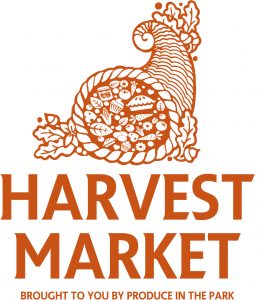
This year, Harvest Market and Spring Celebration Market will be held at the Cass County Community Center and Christmas Market and Sweetheart Market will be held at the Nishna
Valley Family YMCA.
Holiday farmers markets are sponsored by annual sponsors Atlantic Community Promotion Commission, First Whitney Bank and Trust, Cass Health, Deter Motor Co., and Cass County
Tourism. Harvest Market is also being sponsored by Cass County Farm Bureau, and Christmas Market is being sponsored by Meyer & Gross. Produce in the Park continues to welcome
additional sponsors for Sweetheart and Spring Celebration Markets. Businesses and organizations interested in sponsorship should contact Market Manager Brigham Hoegh at
produceintheparkatlanticiowa@gmail.com or 712-249-5870.
A full list of holiday market event details, vendors, and information on pre-ordering will be available online at the Produce in the Park website www.produceintheparkatlanticiowa.com
closer to the market dates. Follow Produce in the Park on Facebook (www.facebook.com/ProduceInThePark) or Instagram
(https://www.instagram.com/produceintheparkatlanticia/) for the latest information.
(Radio Iowa) – Harvest season is underway in Iowa with drought conditions ranging from severe to extreme — and forecasts show those conditions will likely continue well into winter. Meteorologist Dennis Todey, director of the U-S-D-A’s Midwest Climate Hub in Ames, says there are a few benefits to the dry weather, like how the tractors aren’t getting mired in mud. “People, when they’re ready to harvest, are going to be able to get out and harvest because there’s nothing really slowing them down,” Todey says, “though the thing that may slow them down in some cases is that beans may be too dry or something like that. I was hearing people waiting until the evening when it’s a little more humid to do some harvesting.” Todey says the soil continues to dry out and dry deeper across wide sections of Iowa.
“Soils are very dry at this point,” he says, “so soil moisture recharge is a concern and a very serious concern because of some dryness expanding all the way back into 2021 that we didn’t quite recover from completely.” Todey says there are a number of harvest time hazards for farmers and passing motorists due to the dry conditions. “I was driving through southern Minnesota last night and somebody was doing a bean field that looked like there was a fog over the bean field because there was so much dust kicked up,” he say. “I saw somebody tweet, too, that it was a good thing that they had auto-steer because I’m not sure they could see where they were going because of the dust that’s being kicked up. So, multitude of problems because of very severe drought.”
Many locations in Iowa are now showing six-to-eight-inch precipitation deficits for the year.